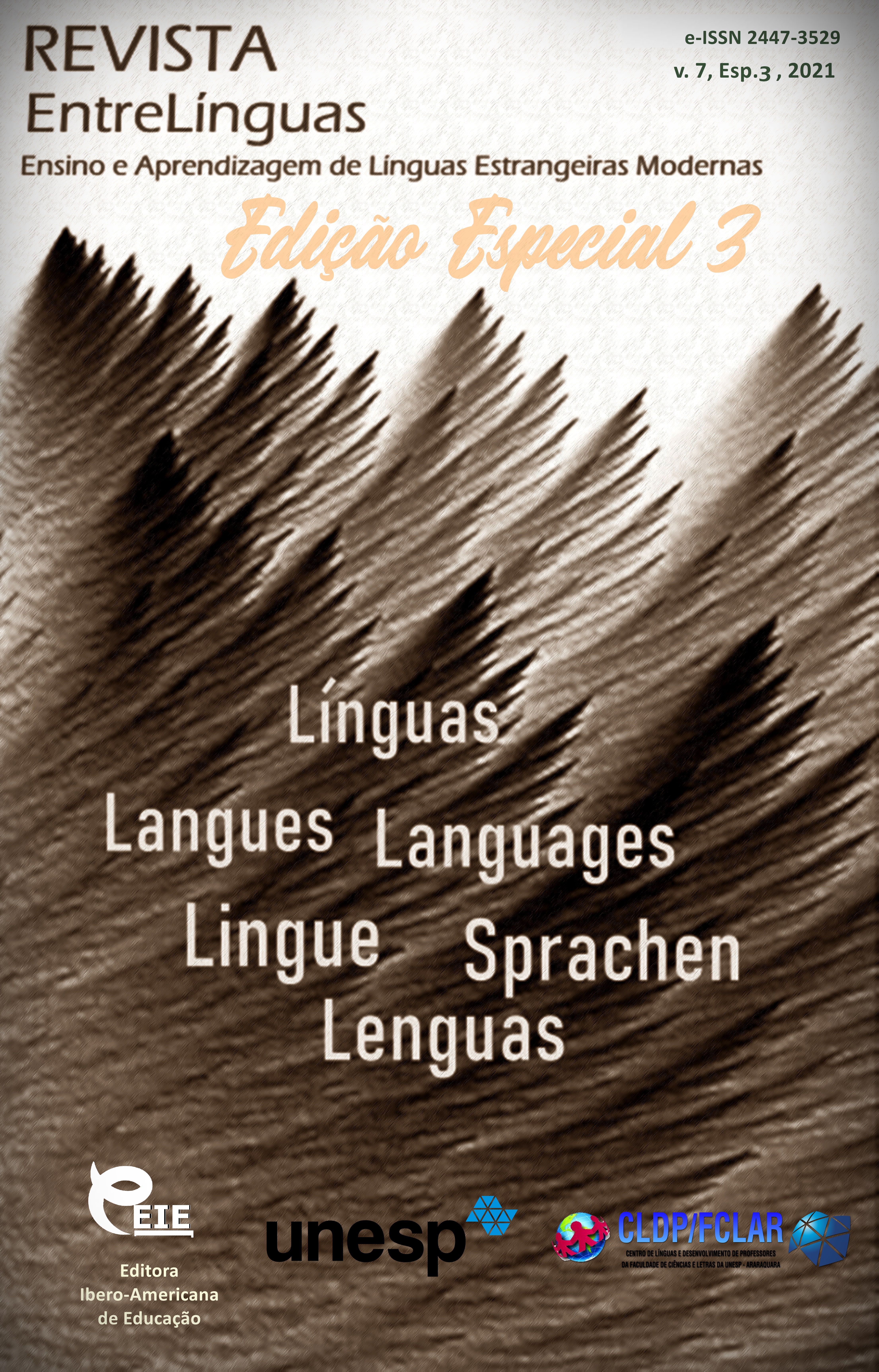Traditional and digital techniques for working with lexical material in english lessons
DOI:
https://doi.org/10.29051/el.v7iesp.3.15731Keywords:
Communication, Foreign language, Students, Speech, Communicative competenceAbstract
The relevance of this study is due to the fact that the lexical skill is an integral part of all types of speech activity, the formation, improvement and development of which is the main task of teaching a foreign language, namely English. The authors focus on the need for good knowledge of vocabulary for the successful development of communicative competence of students in a globalized world. The purpose of this study is to examine the process of forming language competence when teaching a foreign language and to reveal what techniques are better suited for the pre-intermediate and intermediate students based on the research conducted among the students of the first year at Kazan Federal University. Based on the analysis of effective methods for introducing vocabulary in English classes, the authors identified 10 strategies for effective vocabulary learning and compared traditional and digital methods of its introduction and practice. The authors of this article pay special attention to the experience of activating learning new vocabulary in English classes. Examples of lexical exercises that are typical for each stage of working with the vocabulary are suggested. Conclusions based on the survey of 213 students are drawn.
Downloads
References
ABROSIMOVA, G. A. et al. Blended learning in university education. Humanities & Social Sciences Reviews, v. 7, n. 6, p. 6-10, 2019.
ANTONACCI, P. A.; O’CALLAGHAN, C. M. Promoting literacy development: research-based strategies for K-8 learners. California: SAGE Publications, Inc., 2011. 167 p.
BAUMANN, J.; WARE, W. E. Edwards, bumping into spicy, tasty words that catch your tongue: A formative experiment on vocabulary instruction. The Reading Teacher, n. 61, p. 108-122, 2007.
BUCKOWIECKI, E.M. Vocabulary instruction: advice to new teachers. New England Association Journal, v. 2, n. 42, p. 29-40, 2006.
COSKIE, T. L.; DAVIS, K. J. Word wall work: Supporting science talk. Science and Children, v. 46, n. 8, p. 56-58, 2009.
CUNNINGHAM, P. Phonic they use: words for reading and writing. 3. ed. New York: Longman-Addison Wesley, 2000. 232 p.
EREMEEVA, G. R. Dialogization of professional communication between students and lecturers. Journal of Organizational Culture, Communications and Conflict, n. 20, p. 128-134, 2016.
HARMON, J. M. et al. Interactive word walls: more than just reading the writing on walls. Journal of Adolescent & Adult Literacy, n. 52, p. 389-408, 2009.
HENRICHS, E. L. Interactive word walls and student perceptions of vocabulary. Texas State University, 2011. Available: https://digital.library.txstate.edu/handle/10877/2473. Access: 04 June 2020.
HILDEN, K.; JONES, J. Classroom word walls: is yours a tool or a decoration? Reading Today, v. 29, n. 4, p. 9-11, 2012.
JACKSON, J. K. Interactive, conceptual word walls: Transforming content vocabulary instruction one word at a time. International Research in Education, v. 2, n. 1, p. 37-46, 2014.
JACKSON, J.; NARVAEZ, R. Interactive word walls: create a tool to increase science vocabulary in five easy steps. Science and Children, v. 51, n. 1, p. 42-49, 2013.
KENT, M. A. The effect of systematic word wall instruction on the literacy achievement of first grade students. UMI No. 30558, 2006. 176 p.
KHUSAINOVA, R. R.; VALEEV, A. A. Technological aspect of the development of university students foreign language activities. Astra Salvensis, n. 6, p. 746-764, 2018.
KONDRATEVA, I.; SABIROVA, D.; PLOTNIKOVA, N. Subjectivity functions in reflexive and intercultural process of linguistic development. Cypriot Journal of Educational Sciences, v. 13, n. 4, p. 529-536, 2018.
KUVSHINOV, V. I. About work with vocabulary in school. Foreign Languages at School, n. 5, p. 20-24, 2015.
KUZNETSOVA, T. M. Stages of work on the word. Foreign Languages at School, n. 5, p. 88-94, 2011.
MAY, B. Will using a classroom word wall help students successfully learn high frequency words? Winona State University Anthology of k-12 language arts action research, ERIC document Reproduction Service, ED 494233. 2004.
ROGOVA, G. V. RABINOVICH, F. M.; SAKHAROV, T. E. Methods of teaching foreign languages in secondary school. Moscow: Education, 2011. 254 p.
SHAKIRZYANOVA, R. M.; ZAKIROVA, R. R. The creativity development of teenagers in leisure time. Humanities & Social Sciences Reviews, v. 7, n. 6, p. 76-80, 2019.
SOLOVYOVA, E. N. Methods of teaching foreign languages. Basic course of lectures / manual for students and teachers in ped. Universities. Moscow: Education, 2012. 321 p.
VALEEV, A. A. et al. Major areas of foreign language speech activity of university students improvement. Humanities & Social Sciences Reviews, v. 7, n. 6, p. 967-977, 2019.
YATES, P.; CUTHRELL, K.; ROSE, M. Out of the room and into the hall: making content word walls work. The Clearing House: A Journal of Educational Strategies Issues and Ideas, v. 84, n.1, p. 31-36, 2011.
Published
How to Cite
Issue
Section
License

This work is licensed under a Creative Commons Attribution-NonCommercial-ShareAlike 4.0 International License.
Os manuscritos aceitos e publicados são de propriedade da Revista EntreLínguas. Os artigos publicados e as referências citadas na Revista EntreLínguas são de inteira responsabilidade de seus autores.
Transferência de direitos autorais – autorização para publicação
Caso o artigo submetido seja aprovado para publicação, já fica acordado que o(s) autor(es) autoriza(m) a UNESP a reproduzi-lo e publicá-lo na EntreLínguas, entendendo-se os termos “reprodução” e “publicação” conforme definição respectivamente dos incisos VI e I do artigo 5° da Lei 9610/98. O artigo poderá ser acessado pela rede mundial de computadores (Internet), sendo permitidas, a título gratuito, a consulta e a reprodução de exemplar do artigo para uso próprio de quem a consulta, desde que haja a citação ao texto consultado. Essa autorização de publicação 328 EntreLínguas, Araraquara, v. 1, n .2, p. 323-328, jul./dez. 2015 não tem limitação de tempo, ficando a UNESP responsável pela manutenção da identificação do(s) autor(es) do artigo. Os artigos publicados e as referências citadas na Revista EntreLínguas são de inteira responsabilidade de seus autores.











